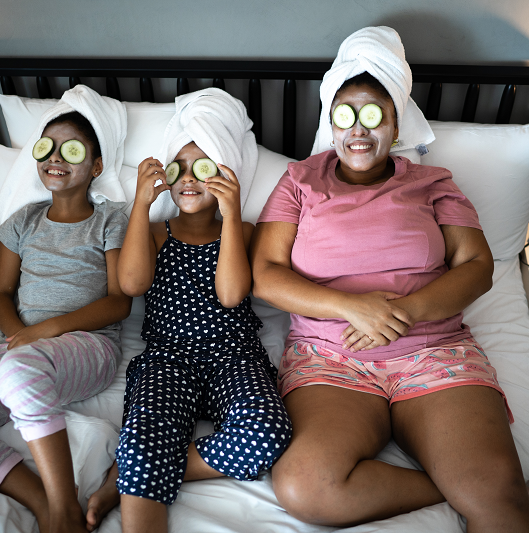6 Ways to Help Your Teen Feel Good About Their Body

July 01, 2025
It's a heartbreaking reality that many young people, even preteens, are struggling with how they see their bodies. Research shows that as many as half of preteen girls and 30% of preteen boys express dissatisfaction with their appearance. This can be a vulnerable time, and sadly, many turn to dieting as a solution.
However, dieting, particularly for developing children, can be a dangerous path. Studies indicate that teen girls who diet are five times more likely to develop an eating disorder, and that number jumps to a staggering 18 times more likely if the dieting becomes restrictive.
"If you notice any changes in your child's eating habits or attitudes towards their body that cause you concern, it's important to open a conversation," advises Noor Al-Husayni, M.D., an attending physician at the adolescent medicine program at the Joseph M Sanzari Children's Hospital at Hackensack University Medical Center. "Talking to them and involving your pediatrician early can make a real difference. Early intervention is key to a successful recovery from an eating disorder."
Signs Your Child Is Struggling With Their Relationship With Food
It's understandable for teenagers to be private, especially when it comes to sensitive topics like their bodies and eating habits. This can make it difficult to know if they're developing an unhealthy relationship with food. Because teens often try to hide disordered eating patterns, it's important to be aware of potential warning signs.
“Parents are the experts on their children, and parents are integral to treatment and recovery,” says Jennifer Northridge, M.D., head of the adolescent medicine program at The Children’s Hospital. “We, as doctors, are not there… parents are really the ones who are the most important part of recovery.”
If you've noticed some of these behaviors in your child, it might be helpful to talk to a doctor. It's understandable to feel worried, and reaching out for support is a positive step. These behaviors could indicate a developing struggle with food and body image:
- Preoccupation with appearance: Spending a lot of time thinking about their body image or comparing themselves to others.
- Frequent weighing: Checking their weight excessively or showing distress about fluctuations.
- Calorie counting: Meticulously tracking calories consumed in every meal or snack.
- Limiting food groups: Avoiding certain foods or entire food groups without a medical reason.
- Changes in eating patterns: Skipping meals, eating significantly less than usual, avoiding previously enjoyed foods, or only eating small portions.
- Avoiding eating socially: Making excuses not to eat around family or friends.
- Separate food preparation: Insisting on preparing their own food separately and measuring it precisely, often eating alone.
Early diagnosis and treatment of eating disorders can significantly improve the chances of recovery. Talking to a doctor can provide guidance and support for both you and your child.
Nurturing a Healthy Relationship with Food and Body Image
Supporting your child in developing a positive body image and healthy relationship with food is a powerful way to nurture their overall well-being. These positive habits can help protect them from developing disordered eating patterns and promote a lifelong sense of self-acceptance.
These strategies may help build a positive food and body image environment:
Change the way you talk about food
Instead of labeling foods as "good" or "bad," let's focus on how food nourishes our bodies and brings us joy. Think about it: broccoli gives us energy, and cake can be a delicious celebration.
“Have a neutral view of different types of foods,” Dr. Al-Husayani says. “There’s no good or bad foods – some are more nutritious, some are more soul-nourishing.”
Be a body-positive role model
Our children listen and learn from us, especially when it comes to how we talk about our own bodies. Let's try to avoid negative self-talk about weight or appearance, and instead focus on appreciating our bodies for all they do.
Dr. Al-Husayni emphasizes how important a parent's attitude is: "Studies show one of the most important factors for kids to have a good relationship with health and body is the adults around them, how they talk about their own body and how they talk about food."
Don’t link food with exercise
It can be common for adults to say, “I’m going to have to work out after this dessert.” It’s important to consider how you’re talking about exercise.
“We try not to link food with exercise, because there’s an element of guilt and then compulsive exercise,” says Dr. Northridge, who notes that it may inspire bad habits: “Skipping a meal afterwards, or throwing it up, or laxative use.”
Create healthy habits for the entire family
Serve everyone the same meals, and find fun ways to exercise together. When you make healthy changes as a family, it should be easier on your child.
“If the whole family is doing that, then it doesn’t feel restrictive in the same way,” Dr. Northridge says.
Eat meals together as a family
Whenever your schedule permits, sit and enjoy meals together. You’ll get family time, and you can model and encourage healthy habits.
“You can see what your child is eating and talk about it,” Dr. Northridge says. “Try to encourage that everybody eats the same foods as much as possible.”
Compliment qualities other than weight
Let's help our children understand that their worth goes far beyond their appearance. Focus on praising their kindness, intelligence, resilience and other wonderful qualities.
“Give them compliments about how smart, strong, kind, how hard-working they are, their decision-making, their resilience,” Dr. Northridge says. “See your child for more than their physical appearance.”
Next Steps & Resources
- Meet our source: Jennifer Northridge, M.D., and Noor Al-Husayni, M.D.
- To make an appointment with Dr. Northridge, Dr. Al-Husayani or a doctor near you, call 800-822-8905 or visit our website.
The material provided through HealthU is intended to be used as general information only and should not replace the advice of your physician. Always consult your physician for individual care.








